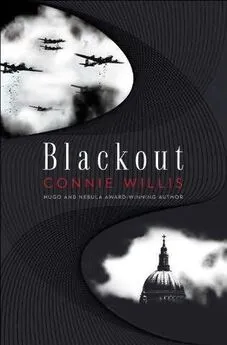Connie Willis - Blackout
- Название:Blackout
- Автор:
- Жанр:
- Издательство:неизвестно
- Год:неизвестен
- ISBN:нет данных
- Рейтинг:
- Избранное:Добавить в избранное
-
Отзывы:
-
Ваша оценка:
Connie Willis - Blackout краткое содержание
In her first novel since 2002, Nebula and Hugo award-winning author Connie Willis returns with a stunning, enormously entertaining novel of time travel, war, and the deeds—great and small—of ordinary people who shape history. In the hands of this acclaimed storyteller, the past and future collide—and the result is at once intriguing, elusive, and frightening.
Oxford in 2060 is a chaotic place. Scores of time-traveling historians are being sent into the past, to destinations including the American Civil War and the attack on the World Trade Center. Michael Davies is prepping to go to Pearl Harbor. Merope Ward is coping with a bunch of bratty 1940 evacuees and trying to talk her thesis adviser, Mr. Dunworthy, into letting her go to VE Day. Polly Churchill’s next assignment will be as a shopgirl in the middle of London’s Blitz. And seventeen-year-old Colin Templer, who has a major crush on Polly, is determined to go to the Crusades so that he can “catch up” to her in age.
But now the time-travel lab is suddenly canceling assignments for no apparent reason and switching around everyone’s schedules. And when Michael, Merope, and Polly finally get to World War II, things just get worse. For there they face air raids, blackouts, unexploded bombs, dive-bombing Stukas, rationing, shrapnel, V-1s, and two of the most incorrigible children in all of history—to say nothing of a growing feeling that not only their assignments but the war and history itself are spiraling out of control.
Blackout - читать онлайн бесплатно полную версию (весь текст целиком)
Интервал:
Закладка:
“Look, there’s a Messerschmitt! ME’s have got five-hundred-pound bombs on ’em. They can blow up a whole train. If they dropped one on you, they wouldn’t be able to find your body or nuthin’. Ka-bloom! You’d disappear, just like that.”
The two of them pressed their noses to the window to search for more planes. Binnie was engrossed in a film magazine one of the young women must have left behind. Eileen picked up the stout man’s newspaper to see if there was an ad for John Lewis or Selfridges which would give their addresses.
Both stores were open till six. Good. With luck, she’d be able to deliver the children and make it to both before they closed. But what if Polly didn’t work at either department store? Eileen scanned the ads, looking for the other name Polly’d mentioned. Dickins and Jones? No. Parker and Co.? No, but she was more convinced than ever the name had begun with a P. Was it P. D. White’s?
No, here it was. Padgett’s. I knew I’d remember it when I saw it. Padgett’s was open till six, too, and from the addresses, it looked as if they were only a few blocks apart. With luck, she could check all three before closing. She hoped there wasn’t a raid tonight. Or if there was, that it wasn’t over Oxford Street. The idea of being in an air raid was terrifying. I should have researched the Blitz so I’d know where and when they were, she thought. But it had never occurred to her that she would need to know those things.
Polly had said the Underground stations had been used as shelters. She could go there if there was a raid. But not all of them were safe-she remembered Colin giving Polly a list of the ones which had been hit, but she couldn’t remember which ones he’d said.
Once I find Polly, I’ll be all right, Eileen thought. She knows everything about the Blitz. Thank goodness she knew what name Polly was using and could ask for Miss Sebastian instead of-
“Polly,” Binnie said.
“What?” Eileen asked sharply, thinking for an awful moment that she’d spoken her thoughts aloud.
“What about Polly? For my name. Polly ’Odbin. Or Molly. Or Vronica.” She shoved the magazine at Eileen and pointed at a photo of Veronica Lake. “Do I look like a Vronica?”
“You look like a toad,” Alf said.
“I do not,” Binnie said and whacked him with the magazine. “Take it back.”
“I won’t!” Alf shouted, shielding his head with his arms. “Toad ’Odbin! Toad ’Odbin!”
One more day, Eileen thought, separating them. I’ll never make it. “Alf, do your planespotting,” she ordered. “Binnie, read your magazine. Theodore, come here and I’ll tell you a story. Once upon a time there was a princess. A wicked witch locked her in a tiny room with two evil monsters-”
“Look,” Alf said. “A barrage balloon!”
“Where?” Theodore asked.
“There.” Alf pointed out the window. “That big silver thing. They use ’em to keep the jerries from dive-bombing.”
That meant they must be nearing London, but when Eileen looked out the window, they were still in the country, and she couldn’t see anything that remotely resembled a barrage balloon.
“You seen a cloud,” Binnie said, but the only clouds were faint, feathery lines crisscrossing the expanse of vivid blue. Looking out at the sky and the passing fields and trees and quaint villages, with their stone churches and thatched cottages, it was difficult to imagine they were in the middle of a war.
Or that they would ever get to London. The afternoon wore on. Alf marked nonexistent Stukas and Bristol Blenheims on his map, Binnie murmured, “Claudette… Olivia… Katharine ’Epburn ’Odburn,” and Theodore fell asleep. Eileen went back to reading the paper. On page four, there was an ad encouraging parents to enroll their children in the Overseas Programme. “Have the comfort of knowing they’re safe,” it read.
Unless they’re on the City of Benares, she thought, looking worriedly at Alf and Binnie. Today was the ninth. If Mrs. Hodbin took them to the office tomorrow and they left for Portsmouth on Wednesday, they might very well end up on the City of Benares. It had sailed on the thirteenth and been sunk four days later.
“I’m hot,” Binnie said, fanning herself with her magazine. It was hot. The afternoon sun was streaming in, but pulling down the shade wasn’t an option. It had been designed for the blackout and shut out all light. And it would deprive Alf of his planespotting, and he’d think up some other mischief.
“I’ll open the window,” Alf said and jumped up on the plush seat. There was a sudden jerk, a whoosh of releasing steam, and the train began to slow sharply.
“What did you do?” Eileen said.
“Nuthin’.”
“I’ll wager he pulled the emergency cord,” Binnie said.
“I never,” Alf said hotly.
“Then why’s the train stoppin’?” she asked.
“Did you let Bill out?” Eileen demanded.
“No.” He rummaged in his haversack and held up the wriggling snake. “See?” He shoved it back in and jumped down. “I’ll wager we’re comin’ to a station.”
He darted for the door. “I’ll go see.”
“No, you will not,” Eileen said, grabbing him. “You three stay here. Binnie, watch Theodore. I’ll go see.” But no station was visible in either direction from the corridor, only a meadow with a stream meandering through it. Several people had come out into the corridor, including the headmistress. Oh, dear, she was still on the train.
“Do you know what’s happening?” one of the passengers asked.
The headmistress turned and glared directly at Eileen. “I suspect someone pulled the communications cord.”
Oh, God, Eileen thought, ducking back into the compartment. They’ll put us off the train in the middle of nowhere. She shut the door and stood there with her back to it.
“Well?” Binnie demanded. “Are we at a station?”
“No.”
“Why’d we stop, then?”
“I’ll wager it’s an air raid,” Alf said, “and the jerries are goin’ to start droppin’ bombs on us any minute.”
“We’ve probably stopped to let a troop train pass,” Eileen said, “and we’ll start again in just a bit.” But they didn’t.
The minutes wore on, the compartment grew hotter, and the number of passengers milling about in the corridor increased. Eileen tried to distract the children with a game of I Spy.
“I’ll wager there’s a spy on the train and that’s why we’ve stopped,” Alf said. “I knew that man who wouldn’t let me sit by the window was a fifth columnist. ’E’s gonna blow up the train.”
“I don’t want-” Theodore began.
“There is not a bomb on the train,” Eileen said, and the guard came in, looking grim.
“Sorry to inconvenience you, madam,” he said, “but I’m afraid we must evacuate the train. You need to collect your things and leave the train.”
“Evacuate?”
“I told you,” Alf said. “There’s a bomb, ain’t there?”
The guard ignored him. “What was your destination, madam?”
“London,” Eileen said. “But-?”
“You’ll be taken by bus the rest of the way,” he said and left before they could ask any more questions.
“Gather up your things,” Eileen said. “Alf, fold up your map. Binnie, hand me my book. Theodore, put on your coat.”
“I don’t want to blow up,” Theodore said. “I want to go home.”
“You won’t blow up, dunderhead,” Binnie said, standing on the seat to take down their luggage. “If it was a bomb, they wouldn’t let you take anything with you,” which made sense.
And it’s a good thing there isn’t one, Eileen thought, wrestling the three of them and the luggage out into the corridor and down to the end of the car, or we’d never make it out in time.
The other passengers were already off the train and standing on the gravel next to the tracks. The headmistress was shouting at the guard. “Are you telling me we’re expected to walk all the way to the nearest village?”
It was obvious that that was exactly what was expected. Several passengers had already set off across the meadow carrying their bags. “I’m afraid so, madam,” the guard said. “It’s not far. You can see the steeple of the church just beyond those trees. A bus should arrive within the hour.”
“I still don’t understand why you can’t take us on to the next station. Or back to-”
“I’m afraid we can’t do that. There’s another train behind us.” He leaned toward her, lowering his voice. “There’s been an incident on the line ahead.”
“I told you there was a bomb,” Alf said. He shoved his way past the headmistress. “What’d ’e blow up?”
The guard glared at him. “A railway bridge.” He turned back to the headmistress. “We greatly regret the inconvenience, madam. Perhaps this boy could help you carry your bags.”
“No, thank you, I will manage on my own.” She turned to Eileen. “I warn you that I have no intention of sharing a bus with a snake,” she said and set off grimly across the meadow after the others.
“Was it a Dornier what dropped the bomb?” Alf, undaunted, asked the guard. “Or a Heinkel III?”
“Come along, Alf,” Eileen said and dragged him away.
“If the train’d been a few minutes earlier,” he mused, “we’d been on that bridge when they dropped the bomb.”
And you and your snake were the ones who made the train late, Eileen thought, remembering the headmistress shaking her finger and the stationmaster looking anxiously at his watch. Which she supposed meant she should be grateful, but somehow she couldn’t manage it. The grass in the meadow was knee-high and impossible to walk through while carrying luggage. Theodore made it a quarter of the way and then demanded to be carried. Alf refused to carry Theodore’s duffel, and Binnie dawdled behind.
“Stop picking flowers and come along,” Eileen said.
“I’m pickin’ a name,” Binnie said. “Daisy. Daisy Odbin.”
“Or Skunk Cabbage Odbin,” Alf said.
Binnie ignored him. “Or Violet. Or Mata.”
“What sort of flower’s that?”
“It ain’t a flower, slowcoach. It’s a spy. Mata ’Ari. Mata ’Ari Odbin.”
“I’m hot,” Alf said. “Can’t we stop and rest?”
“Yes,” Eileen said, even though the rest of the passengers were far ahead. Or perhaps that was just as well, considering. She set Theodore down. “Alf, they won’t let you take your snake on the bus. You need to let it go.”
“’Ere?” Alf said. “There ain’t nothin’ for Bill to eat ’ere.” He pulled the writhing snake not out of his haversack, but out of his pocket. “’E’ll starve.”
“Nonsense,” she said. “This is a perfect place for him. Grass, flowers, insects.”
It was a perfect place. If she hadn’t been trekking three children and all this luggage across it, she would have loved standing here knee-deep in the fragrant grass, the breeze ruffling her hair, listening to the faint hum of bees. The meadow was golden in the afternoon light and full of buttercups and Queen Anne’s lace. A copper dragonfly hovered above a spray of white stitchwort, and a bird flashed past, dark blue against the bright blue sky.
“But if I leave Bill ’ere, ’e might get bombed,” Alf said, dangling the snake in front of Binnie, who was unimpressed. “The Dornier might come back and-”
“Let him go,” Eileen said firmly.
“But ’e’ll be lonely,” Alf said. “You wouldn’t much like bein’ left all alone in a strange place.”
You’re right, I don’t. “Let him go,” she said. “Now.”
Читать дальшеИнтервал:
Закладка:

![Jane_BlackCat - Понять не поздно... [СИ]](/books/1148838/jane-blackcat-ponyat-ne-pozdno-si.webp)
![Jane_BlackCat - За краем Вечности [СИ]](/books/1148839/jane-blackcat-za-kraem-vechnosti-si.webp)

